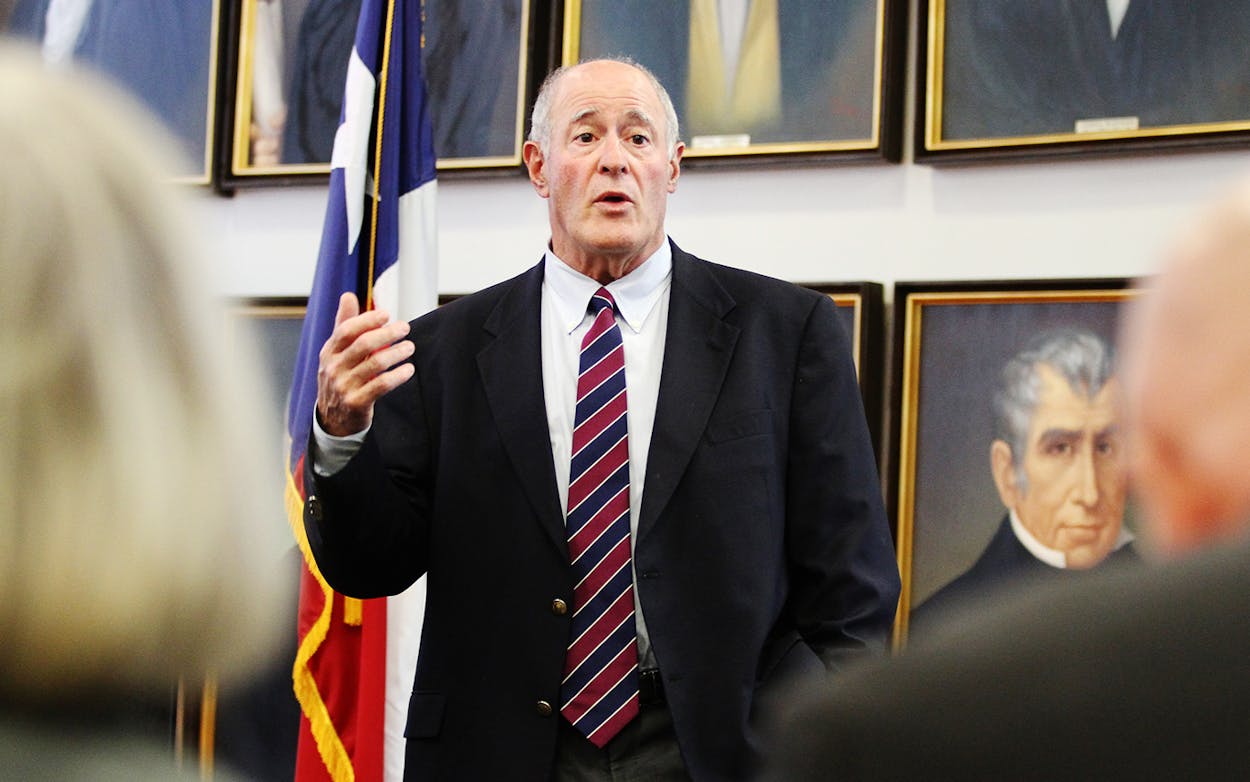Sometimes the pursuit of civility can be more potent than the wielding of raw power. On Monday morning, Lieutenant Governor Dan Patrick made moves to blow up a long-standing Senate tradition—the three-fifths rule—in order to pass his top legislative priority, property tax reform. But in a dramatic turn of events, his Republican nemesis, Senator Kel Seliger, of Amarillo, preempted the move by simultaneously giving Patrick his property tax bill and preserving the three-fifths rule. At the end of the day, Patrick got what he wanted, but Seliger, in an eleven-minute speech, offered an implicit indictment of Patrick’s bullying, ideological governing style that may well overshadow the victory… at least for now.
“There are a lot of people in this room who very well understand politics and the possession and use of power,” Seliger said. “It is implicit in the legislative process. I’m afraid, though, that what we don’t often talk about is … statesmanship. What can we do to ensure that our discourse and our disagreement, however contentious, is marked [by] more than intensity and more than criticism? It’s statesmanship—a regard for other people’s ideas.”
One of the few remaining moderate Republicans in the Senate, Seliger has clashed with Patrick all session, particularly after the lieutenant governor stripped him of key committee assignments. For weeks, Seliger has denied Patrick his vote on Senate Bill 2, the property tax legislation that Patrick so desperately wants. Seliger’s vote was key: under a long-standing tradition, the Senate requires a three-fifths majority, or nineteen senators, to take up debate on legislation. With nineteen Republicans in the Senate, Patrick can’t afford to lose a single one for any bill that falls along purely partisan lines. So, last week, Patrick warned that he would use the so-called nuclear option on Monday to circumvent the three-fifths rule. A simple majority would’ve been needed to pass SB 2.
What Seliger did surprised many: he decided to vote for SB 2 under the normal rules, giving Patrick his three-fifths majority. The Amarillo Republican explained in his impassioned speech that he did so because he believed the bill would’ve passed regardless and he felt it was more important to preserve the Senate’s catalyst for comity and bipartisanship.
“A very well-known officeholder [once] said the Texas Senate is the most deliberative, organized body that there is, and when we contemplate something like doing away with the nineteen-vote rule, we are not,” Seliger said. “We are partisan and we are divisive … what makes us any different from Washington, D.C., and whatever states do that sort of thing?”
Seliger said Patrick and his allies had unfairly characterized critics of SB 2 as being insufficiently supportive of property tax reform. “It’s a lie,” the former mayor declared. “We should all be [concerned] because we all have constituents who own homes and businesses. It seems like people would be surprised to find out today that Democrats in this body also have constituents who own homes. They own businesses. And they are concerned about taxes as anyone else.” Seliger went on: “I was afraid that what we were going to prove today, that what is important is not the ideas and the tone of discourse on those ideas. It’s power—the thing that most surely would polarize a body even if it otherwise inclined to be deliberative.”
Later Monday, Seliger told reporters that he had determined over the weekend that Patrick was going to get his legislative victory, even if it came at the cost of the reputation of the Senate. “It would have painted us all,” he said of Patrick using the nuclear option.
It’s worth, however, thinking about Monday’s events from a different perspective—that of Dan Patrick and his base. Patrick has been promising on conservative talk radio and elsewhere that he will get property tax reform passed, one way or the other. The means don’t matter all that much. And he was clearly willing to go pretty far to deliver it; he was willing to risk the wrath of those who cherish the Senate’s process in order to get it done. But at the end of the day, not only had he passed Senate Bill 2, he’d also avoided having to exercise the “nuclear option.” Some might see that as a win-win for Dan Patrick.
Seliger seemed to address this as he closed his speech. He said his actions were about the long term, not just the partisan political victories of the moment.
“I’m voting for the Texas Senate, for our traditions and the reputation that we have as a deliberative body, with the thought that we don’t have that reputation” just because of the past, he said. “We will have that reputation because, going forward, we deserve it.”
- More About:
- Politics & Policy
- Texas Senate
- Dan Patrick






